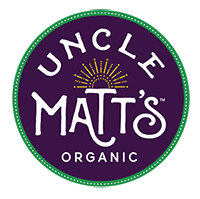Check Out These Seven Sustainable Swaps to Detox Your Home
Did you know that there are around 75,000 chemicals in everyday use? And about 1,000 new ones enter the market every year? Of those, only 2 to 3% have been adequately tested for safety!
Here’s how to make your home safer and more sustainable with 7 easy swaps. Brought to you by Generations of Organic.
According to the Environmental Working Group there are around 75,000 chemicals in everyday use with some 1,000 new ones entering the market every year—yet only 2 to 3% have been adequately tested for safety!
SWAP YOUR:
1. Common laundry detergent FOR plant-based detergents.
“Free and Clear” doesn’t necessarily mean your detergent is free of harmful chemicals. In fact, 1, 4 Dioxane is a synthetic petrochemical commonly found in laundry detergent, but is not labeled, and is associated with cancer and liver disease.
2. Toxic weed killers FOR vinegar in a spray bottle.
Glyphosate, the toxic weed killer and active ingredient in Roundup, can cause headaches and dizziness and even genetic damage to human cells. This may lead to an increased risk of cancer in those with repeated exposure.
3. Regular cotton sheets FOR organic cotton sheets.
Conventionally grown cotton uses more insecticides than any other single crop. Each year cotton producers around the world spray more than 10% of the world’s pesticides and nearly 25% of the world’s insecticides. We spend one-third of our lives sleeping on those sheets!
4. Paraben-based lotions FOR organic cocoa butter, coconut oil, or olive oil.
Studies have linked parabens (a type of preservative) to breast cancer because of their estrogen-like properties that build up in breast tissue. Go for natural, plant-based moisturizers.
5. Non-stick pans FOR ceramic lined or cast iron pans.
Teflon, and other similar non-stick coatings that line non-stick pots and pans, emits a chemical called PFOA (perfluorooctanoic acid). Fumes from heated PFOA have been found to cause birth and developmental disorders and negatively affect the brain and nervous system.
6. Standard petroleum-based paraffin candles FOR organic soy or beeswax candles with organic essential oils.
Petroleum-based candles often contain carcinogens, neurotoxins, and reproductive toxins. Synthetic fragrances generally contain hormone-disrupting phthalates. Avoid indoor air pollution and choose natural luminescence.
7. Plastic food storage containers FOR reusable glass or stainless steel containers.
Plastic food storage containers have been shown to leach the harmful hormone-disrupting chemical Bisphenol A (BPA) into food after microwaving or repeated uses. Instead, choose non-porous materials for your leftovers.
For more sustainable solutions and sources, please visit The Organic Center at www.organic-center.org and www.generationsoforganic.org.


